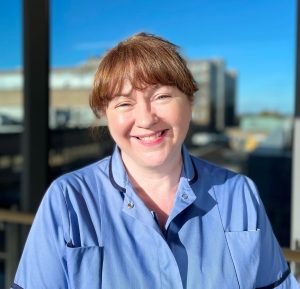
Hello, my name is Sarah Turnbull and I am the Senior Nurse for Palliative Care Services at the Newcastle Hospitals.
My role involves managing the Palliative Care Teams across the four sites – Freeman Hospital; RVI; NCCC and in the Community.
I also manage the End-of-Life Care Nurse Specialist and will manage our new Palliative and End of Life Care Clinical Educator for Care Homes and Gold Standards Educational Facilitator once recruited.
My key responsibilities consist of recruitment, HR issues, staff development, complaints, and investigations, proposals, grant applications and investments for service improvement, leading, participating, and attending strategic and organisational meetings.
Tell us about your career in palliative care
I trained at Newcastle Hospitals and began my palliative care career at St Oswald’s hospice. Here I commenced my degree in Practice Development (Palliative Care).
I then moved over to South Tyneside to take up the role as a Community Palliative Care Clinical Nurse Specialist where I completed my degree, commenced clinical skills training and non-medical nurse prescribing. I carried a full caseload of palliative and end of life care patients and was honoured whenever I made a difference for a patient or their family.
Then 18 months ago I started a new role for the North East Ambulance Service creating, developing and evaluating a Palliative and End of Life Care Service covering the North East region. I have just completed my Masters in NHS Global Leadership and Management in Health Care.
What makes you passionate about what you do?
It is essential that we provide evidence based holistic and personalised care for every patient to ensure they die where they choose and with dignity because as Dame Cicely Saunders (founder of the hospice movement) said “How people die remains in the memory of those who live on”.
I am passionate about Palliative and End of Life Care
All of this role excites me as it is so varied and covers such a huge remit. I love the recruitment and seeing staff flourish and develop into their roles.
I am very keen on professional development and am excited to see some of our nursing staff embark on clinical skills training and non-medical prescribing. I understand how important these skills are for nurses especially in the community.
What do you think is the future for palliative care?
I am feeling very positive about our work with the GSF team and how that will impact our patients and their relatives and am also looking forward to the creation and development of the Freeman Hospital Haven. This will replicate the RVI Haven where a dying patient’s relatives can go to a private facility to have a hot drink, warm a meal, and use the shower facilities – to spend time away from the clinical environment to reflect and take a breath.
Personally, I would have loved a facility like this to go to when my own father was dying. We know from feedback what the RVI Haven means to families and to have a similar bespoke place will truly make a difference.
And finally…
I would just like to say a huge thanks to everyone caring for palliative and end of life care patients as I appreciate how difficult this can be.
We are here for staff to support, encourage, train, and educate but also to engage and collaborate with. Please do not hesitate to get in touch if I or the team can help with anything.